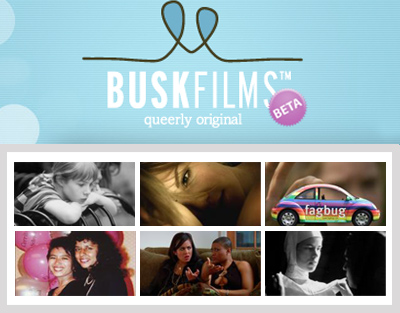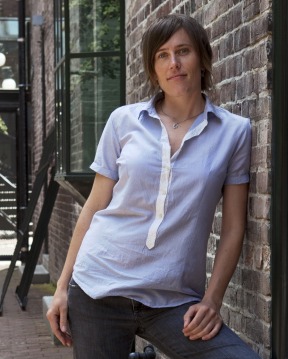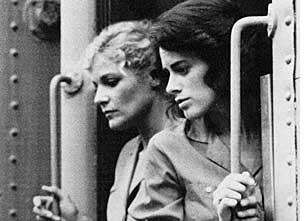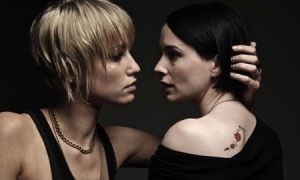
The dinosaurs of the film industry have been resisting the advent of high quality video streaming, DRM and file sharing since those game-changers first showed up on the scene, and they’ve been waging a fruitless war over content and distribution, using copyright claims and old money as their last line of defense. In the end, they will lose out to those who embraced the online digital distribution method first: the artists and filmmakers themselves.
Because film-making itself is what is at the heart of the industry, a new era of digital film has evolved, with filmmakers no longer needing to depend on festivals or distribution deals to find an audience. These filmmakers use the web to showcase their work, and connect with an audience who could then potentially fund new projects. This system will hopefully create the film industry of the future.
Gay and lesbian filmmakers have always been at a greater disadvantage, with limited funding available and less chance of their films being picked up by major distributors. The audience has always been there for independent LGBT film, but the number of films available has been scant, and in certain markets, completely unavailable.

Filmmaker and producer Andrea Wing wants to change that, and with the creation of BuskFilms, she and her team have given a home to the growing market of independent LGBT film. Busk is a video-on-demand site, showcasing the best in short films, full length features and documentaries. Andrea is part of the new breed; capitalizing on, instead of rejecting, the power of the web to tell stories with film. We recently asked Andrea some questions about herself, and her exciting new project.
Why is the site called “BuskFilms”?
The literal definition of busk is performance in a public space which really resonated for me. BuskFilms provides a stage for filmmakers to present their work and share in the revenues. Secondly, it was important to have an androgynous name that didn’t limit BuskFilms to a specific niche. For now we’re focusing on lesbian-themed films but plan to incorporate more gay male and transgender content in the future. I also really wanted the branding to be contemporary and indicative of where we are heading as a community.
What kinds of films did you make/produce before starting BuskFilms?
My filmmaking experience has revolved largely around documentaries. However, like every good queer out of film school, I did make a few lesbian dramatic shorts. I should rephrase that, I shot lesbian sex scenes with some dialogue at the beginning and end. Beyond that, I have directed and produced for television, shot Behind The Scenes/EPKs for film and continue to do commercial work.
What was the first lesbian film you ever saw? How did it resonate with you?

Desert Hearts. It was on VHS. My mom rented it by “accident”. The Cay character was fantastic, she totally epitomized a woman who was wild and free, bold and unapologetic. It is hard not to love a character like that and I suppose it was her skill driving in reverse that really resonated with me. I still practice driving backwards at high speeds and so far I’ve only had one tiny mishap. Luckily the truck was a rental.
Do you feel like a new era of mainstream gay films is upon us?
It definitely feels like there has been a shift in the stories being told. It seems as though films are focusing less on lesbian-specific struggles and more so on the human condition. Films from the past have helped bring gay into the mainstream and to have The Kids Are Alright up for an Oscar (or four) is incredibly exciting. Furthering that, Pariah opened Sundance Film Festival with great success and has been picked up for distribution by Focus Features. Both of these developments could spell an easier time for lesbian films when it comes to find funding and favorable distribution deals. Throw in decreasing production costs and increasing accessibility to audiences and I would say that it’s a fine time to be in the lesbian film world.
What about Gay TV?
In regards to television, Ilene Chaiken has had her fair share of criticism for many of the story lines in The L Word and yes, she did go overboard in some episodes but the fact remains, she was breaking new ground. Ilene is a powerhouse and kudos to her in helping to bring lesbians into the mainstream. A perfect example of the direction of Gay TV is Lip Service, less lofty, a bit gritty and more realistic.

Then there’s the Internet, which has revolutionized how content is delivered and consumed. BuskFilms has come into the market at a really exciting time. Wherever Internet exists, our films are available. This means that filmmakers are able to tap into a worldwide audience and share in the revenues, as a large percentage of the rental fee goes directly back into their pockets. However, it’s not only only about supporting new films being produced, it’s also about breathing new life back into films that have worked their way through festival circuits. We know there are a lot of great lesbian films out there and our goal is to bring these films online so that they are available to a global audience.
What’s your thought on internet piracy of films?
It’s very clear that piracy is damaging to content creators. We recently licensed the lesbian film And Then Came Lola and it has been interesting to hear firsthand their battle with piracy. If independent filmmakers can’t recoup the money that it cost them to create their project, then I know for a fact we won’t see filmmakers like Ellen & Megan creating more films. This is a cultural tragedy and I don’t feel like I am being dramatic when I say this. It’s interesting because I hear people say that they only download from big corporations, like some modern day Robin Hood but it’s a slippery slope when you start making justifications like that. Put yourself in the shoes of the artist. Imagine you’ve dumped your life savings into a project and suddenly you see people around the world sharing it for free. Unless you’re a trust fund kid or have a hot sugar mama, I highly doubt you would be able to continue to afford to make and share your art. If we want queer stories to be told then take the high road, pull out your wallet and support it.
Finally, do you have any advice for young lesbian filmmakers?
1. Find a mentor.
2. Surround yourself with good people.
3. Don’t be afraid to make mistakes.
4. Shoot. Shoot. Shoot. And learn how to edit, it will improve your directing.
I also really encourage young filmmakers to get in contact with BuskFilms if they have made a film that they think would be a good fit for the site. We are always looking for new content and are very interested in helping emerging directors find an audience.
Be sure to check out BuskFilms and their constantly growing collection of LGBT films.